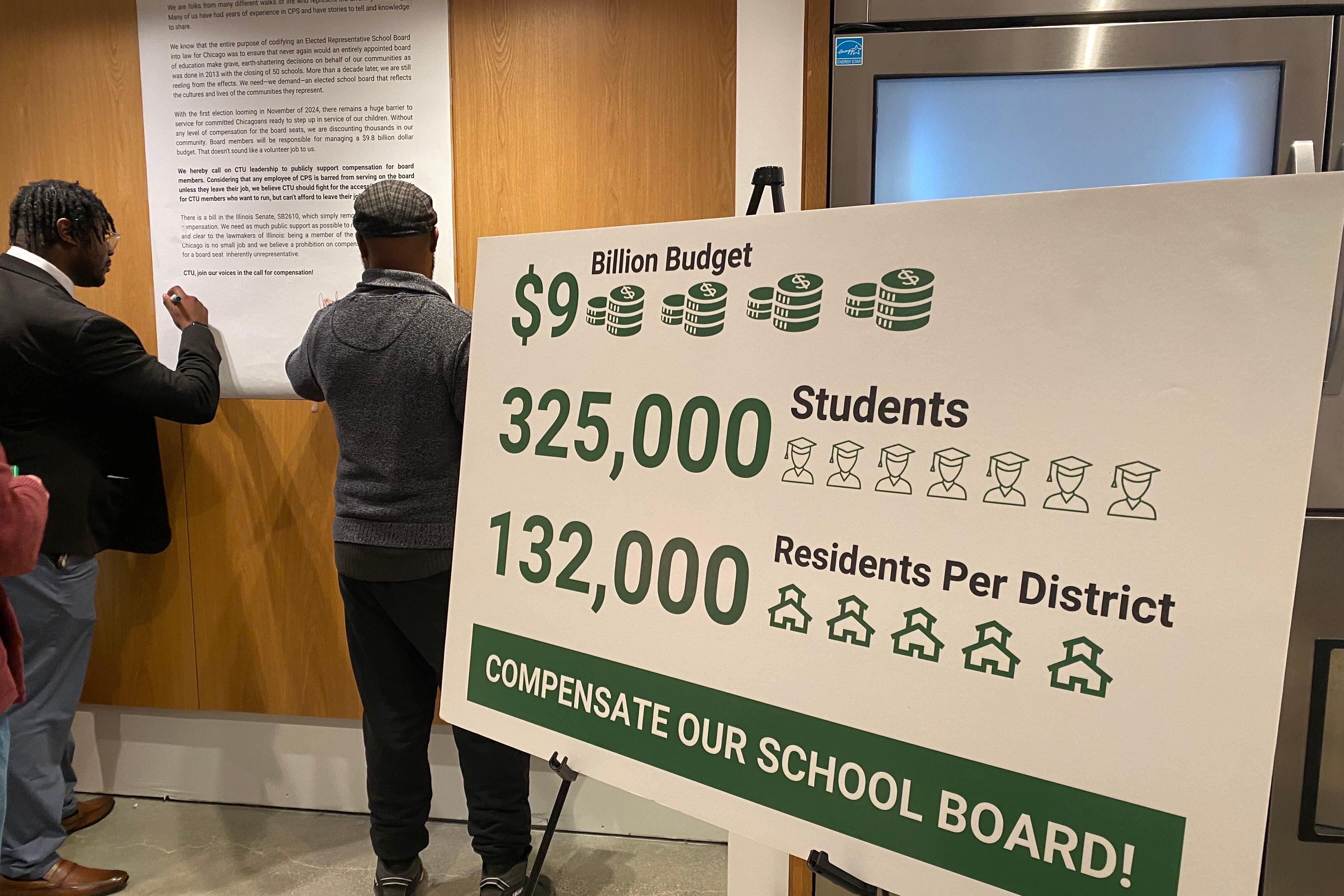Sign up for Chalkbeat Chicago’s free daily newsletter to keep up with the latest education news.
Education advocates are renewing a push to change Illinois law to allow Chicago school board members to be paid — with the hope that would encourage teachers and parents from low-income households to represent Chicago Public Schools’ diverse student body.
State law currently does not allow school board members to be paid, though they can be reimbursed for expenses related to the job. But a bill filed in the state senate last fall would allow Chicago Board of Education members to be paid.
Chicago’s first school board elections take place this November, with a new half-elected, half-appointed 21-member board taking office January 2025. Candidates are already emerging now that they can collect signatures to get on the ballot.
Educators for Excellence, a nonprofit that advocates for teacher voice in policy and decision making, held an event earlier this month to rally support for paying Chicago school board members.
Corrina Demma, an organizer with Educators for Excellence, noted that because state law prohibits employees of Chicago Public Schools from sitting on the elected school board, teachers could run for a seat, but would have to quit their job in order to serve. Educators for Excellence has penned an open letter asking the Chicago Teachers Union to publicly support paying Chicago school board members.
The Chicago Teachers Union has yet to comment on whether it will support a measure for compensation.
Corinne Lydon, a middle school teacher in the city’s Austin neighborhood and a CPS parent who switched careers later in life, spoke at the Educators for Excellence event and said there’s no way she could have served on the school board when her children were younger and she worked in the restaurant and bar industry.
“As a low-income single mother who was struggling to make ends meet, I was always working three, four jobs,” Lydon said. “You desperately want to do something, but you can’t afford to represent your own child.”
Being a CPS board member requires between 25-30 hours of work per month, according to the board’s website, and involves attending public meetings, briefings with district officials, visiting schools, and reading hundreds of pages of documents every month.
“The elected school board role is not a small job,” Demma said. “You’re managing a $9.8 billion budget. That’s a huge amount of money.”
State Sen. Robert Martwick, who sponsored legislation creating an elected school board in Chicago, said negotiations are underway for compensating board members, but he’s not hopeful that legislation will be passed this year.
Chicago Public Schools is facing a $391 million deficit next school year as federal COVID recovery money runs out. Those who argue against paying Chicago’s 21 future school board members say it’s not the time to add additional costs.
In Colorado, which experienced a similar debate a few years ago over whether serving on a school board is a job or a civic duty, opponents argued the state’s underfunded schools should not be spending even small amounts on paying school board members. Ultimately, Colorado lawmakers voted to allow — but not require — school board members to be compensated and last year, Denver’s elected school board voted to pay newly-elected, incoming members up to $33,000 annually.
School boards under mayoral control in New York City and Philadelphia do not pay their members. In Los Angeles, elected school board members make up to $125,000.
In Indiana, school board members can receive a stipend of up to $2,000 per year, in addition to meeting stipends that max out at $112. In some states, such as Florida and Nevada, board members are paid a salary.
In 2021, when lawmakers first approved an elected school board for Chicago, Martwick pushed to allow school board members to be paid. But he said he ultimately took out the provision to get support for the legislation from some suburban and rural legislators.
Kara Kienzler, a spokesperson for the Illinois Association of Schools Boards — an organization that trains school board members across the state — said its members have not adopted a stance on compensation for board members.
There’s not much research on whether paying school board members impacts how schools operate. But a study out of Duke University and the University of North Carolina-Chapel Hill looked at whether state legislatures with higher salaries attracted more economically diverse representatives. The researchers found states with higher salaries actually had fewer working-class people serving.
Still, some research does show when politicians are paid more, they are more efficient and pay closer attention to the concerns of the people they represent. Research also shows that having diverse school boards does matter for how schools operate.
Lorena Lopez, a CPS parent, local school council member, and advocate with Kids First Chicago, said compensating board members could help ensure diversity on the CPS board, which would ultimately mean a “more equitable, innovative, and progressive school district.”
A recent Kids First Chicago poll found that more than 70% of Chicago voters believe elected school board members should receive a stipend or salary for serving on the board.
Illinois Families For Public Schools has expressed support for paying board members because it would give parents and community members a “meaningful, realistic ability to run and serve,” which was the intent of “a generation of community organizing” that made the looming school board elections a reality.
Samantha Smylie contributed.
Becky Vevea is the bureau chief for Chalkbeat Chicago. Contact Becky at bvevea@chalkbeat.org.






